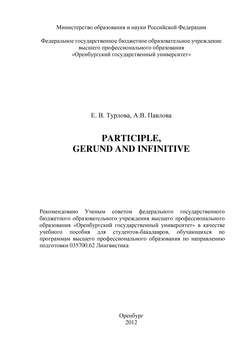Participle, Gerund and Infinitive

Реклама. ООО «ЛитРес», ИНН: 7719571260.
Оглавление
Е. В. Турлова. Participle, Gerund and Infinitive
Введение
1 The non-finite forms of the verb (The verbals)
1.1 General Notion
1.2 The characteristic traits of the verbals
2 The Participle
2.1 General notion
2.2 The tense distinctions of the participle
2.3 The voice distinctions of the participle
2.4 Syntactic functions of Participle I
2.5 Syntactic functions of Participle II
2.6 Mixed Bag
3 The Gerund
3.1 General notion. Double nature of the Gerund
3.2 The tense and voice distinctions of the gerund
3.3 The syntactical characteristics
3.4 The use of the gerund
4 The Infinitive
4.1 General notion. Nominal and verbal character
4.2 The tense and aspect distinctions of the infinitive
4.3 The voice distinctions of the infinitive
4.4 The use of the infinitive without the particle to (the bare infinitive)
4.5 The functions of the infinitive in the sentence
4.6 Infinitive constructions
5 Final Tests
Bibliography
Отрывок из книги
The verb has finite and non-finite forms, which are also called verbals. The verbals do not express person, number or mood. Therefore they cannot be used as the predicate of a sentence.
e. g. He does his home-work. (does – finite form of the verb, it expresses 3rd person, singular, present tense, active voice, indicative mood, non-perfect, non-continuous)
.....
a) of time:
As an adverbial modifier of time participle I may be preceded by the conjunctions when, while:
.....